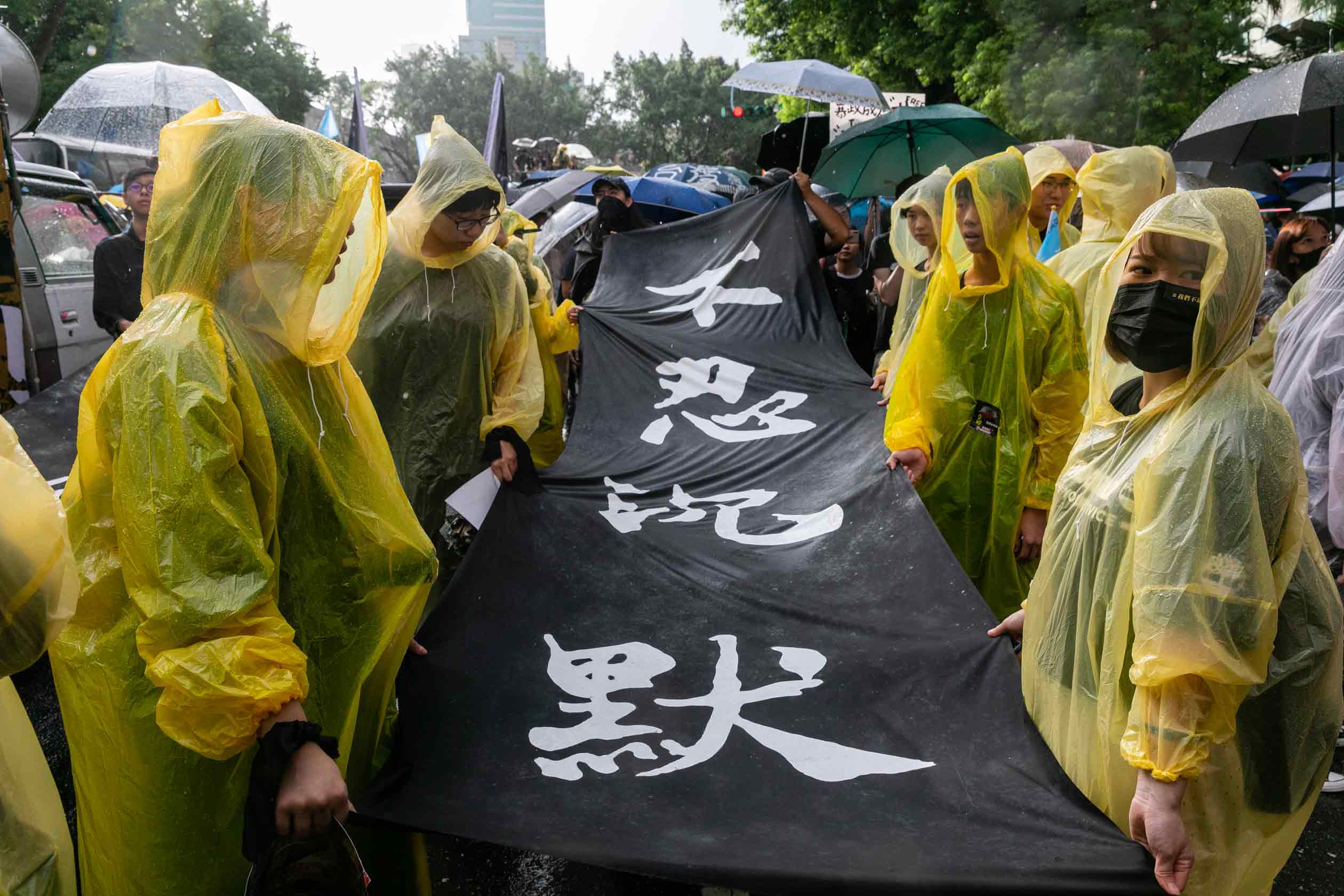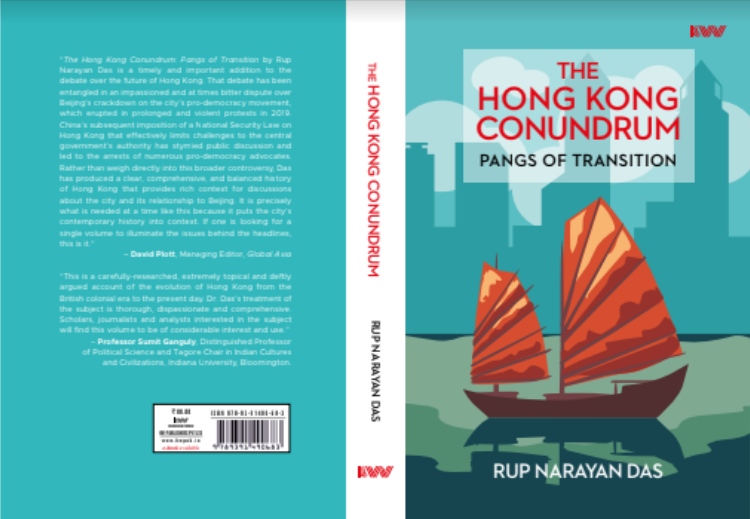Book Review of “The Hong Kong Conundrum” and what it means for Taiwan

Source:Getty Images
In his latest book, “The Hong Kong Conundrum: Pangs of Transition”, Dr. Rup Narayan Das examined the history and feasibility of China’s ‘One Country, Two Systems’. What implications do Hong Kong’s developments hold for Taiwan’s democracy?
Views
Book Review of “The Hong Kong Conundrum” and what it means for Taiwan
By Naina Singhweb only
The year 2022 marks the 25th anniversary of the establishment of Hong Kong Special Administrative Region (HKSAR). To the Hong Kong government, it is the benchmark representative of the ‘success’ and ‘prosperity’ of the region under the One Country, Two Systems arrangement; encapsulated in this year’s motto “A New Era, Stability, Prosperity, Opportunity”. While to observant others, it is a region in quarter-life crisis facing intensive securitisation of its liberal ethos from an authoritarian political centre. Since Xi Jinping’s arrival in Beijing, Hong Kong’s autonomy has been gradually eroding and the roll out of National Security Law appears to be the decisive nail in the coffin for Hong Kong’s liberal political culture and values.
Was the concocted blend of laissez-faire economy with limited democracy always destined to crumble under China’s sovereignty? A question Dr. Rup Narayan Das, Senior Fellow of Indian Council of Social Science Research and former Joint Secretary Lok Sabha Secretariat attempts to analyse in his recent work titled; The Hong Kong Conundrum: Pangs of Transition. Composed of eight chapters and a postscript, the book takes on an ambitious task to trace Hong Kong’s journey from a British colony to PRC’s territory and from a ‘barren Island’ to ‘Asia’s World City’. By digging in historical treaties, charters, personalities and declarations, author aims to situate the viability of ‘one country, two systems’ and future trajectory of Hong Kong’s democracy in their very historical genesis.
According to Dr. Das, the problem of HKSAR democracy lies in the very fact that its political identity has always been ‘incidental’ and ‘secondary’ to its economic identity, doesn’t matter the sovereign. Firstly, the British government avoided any ‘exuberance of democracy’ in its administration to shelter capitalistic economy and later National People’s Congress claws on the Basic Law, i.e. HKSAR's de-facto constitution left political democracy at the mercy of communist PRC. He agrees with Ambrose King Yeo-Chi's observation that Colonial era executive, legislative and other representative institutions were reflective of the ‘administrative absorption of politics’. It was a co-option of handpicked social elites, especially Chinese populace, in an ‘executive-led’ administration orchestrated by the British government, which with transfer of administration became Beijing’s prerogative.
Hong Kong’s demography was rarely exposed to ‘the dynamics and complexities of electoral politics’ and Hong Kong to the people’s mandate. It's the reality of lease expiration coupled with Beijing’s brutal act at Tiananmen square that raised the alarm bell for democratic urgency in the region. Dr. Das attributes this quandary to ‘Congenital Irreconcilability’.
The Chinese always perceived colonial rule of Hong Kong as a ‘symbol of western imperialist domination and national humiliation’ and now sprouts of democratisation are seen as ‘setting a trap for China’. With China’s global and economic rise and loud anti-United States project, the fate of Hong Kong’s free press, independent judiciary and liberal ideals is increasingly weaved in a broader ideological lens of Washington consensus vs. Beijing consensus.
The author also goes further to question China’s sincerity towards Hong Kong economic well-being. Since its rise as a commercial and trade centre, the territory has been in ‘symbiotic relationship’ with the PRC. Mainland provinces, especially Guangdong, needed Hong Kong’s function as a gateway of foreign investment and link to the west, while the region needed its most basic necessities and labour supply from the former. But, with the rise of Shenzhen as an economic and financial hub, where will Hong Kong fit in Xi’s ambitions? At the moment, it is an ‘enclave of democracy’ which needs to be choked for the survival of the Communist Party of China, regardless of its consequences for the region's economy. One country is the ‘precondition’ for the survival of two systems.
 (Source: Chien-Ying Chiu) Hong Kong-support event in Taiwan
(Source: Chien-Ying Chiu) Hong Kong-support event in Taiwan
On the background of the eroding trust in ‘One Country, Two Systems’- once considered ‘an ingenious idea’ by Margaret Thatcher- the feasibility of its replication in Taiwan is also quipped.
Beijing has always lauded the utility of the arrangement to define the independent reality of Taiwan and at the same to entice its population to outright support the propaganda. But, one can not point out enough times that Taiwan has absolute authority within its own territory. It is a full-functioning democracy with a vocal population against political arrangements dictated by Beijing.
Moreover, the Kuomintang Party, a staunch adherent to an ‘ambiguous’ idea of inevitable unification, is also finding it extremely difficult to balance both Chinese and Taiwanese sensibilities towards ‘sovereignty’. Not to mention, it has strengthened the appreciation and goodwill for Taiwan’s individuality across the globe; a source of anxiety for China, the author notes. The silencing of democratic voices under the National Security Law in Hong Kong and overhauling of elections to place ‘Patriots’ loyal to CCP have only ascertained the value of PRC promises and plans for Taiwan.
To add further to the author's references to Taiwan; the Hong Kong crisis has been no less than an eye-opener for the island and also the pro-china factions. Many analysts have attributed the landslide victory of President Tsai and Democratic Progressive Party (DPP) in the national election to the blatant exhibition of CCP authoritarianism in the neighbourhood.
China in recent years have emboldened its acts to destroy Taiwanese democracy from within with its misinformation and disinformation campaigns. It uses the values of freedom of speech and press in open societies to divide and rule. Despite the DPP's noble aim to diversify Taiwan's economic profile, its enduring economic dependence on the mainland is a threat to both common people and national economic security.
In Xi’s world, unification of the geographical land under CPP matters more than the future well-being of the region; economic ramifications do not seem to chain his ambitions. China’s “Taiwan Compatriots” have to have a deeper and harsher look at how compatible their vision of greater integration with China is with Taiwan’s economic and democratic identity.
The cross-strait relations have always been tied to interpretations and the freedom to thrive in ambiguity is narrowing with ‘non-peaceful’ means being actively propagated as the ‘only option’ by Beijing. The political rhetoric should not be prioritised with ‘Taiwan’s way’ being at stake.
As the author has expressed; Hong Kong is more than a geographical territory; it is ‘a way of life’. It has a legacy of diversity and inclusion; a very core to its identity and spirit. An authoritarian crackdown on Hong Kong is equally an attack on the values of multiculturalism and a cause of anxiety for its diverse minority.
 (Source: Naina Singh) Book cover of '' The Hong Kong Conundrum''
(Source: Naina Singh) Book cover of '' The Hong Kong Conundrum''
The book makes a timely contribution to bring out the question of non-ethnic Chinese, in this case Hong Kong Indians, in this changing dynamic. The chapter dedicated to the topic highlights the contribution made by Indians to the city of Hong Kong, one such being, prominent businessmen Hormusjee Naorojee Mody’s donation to establish University of Hong Kong. Separate from their homeland and equally detached from powerful Chinese and British, they have created their own ‘subculture’. They were abundant before by all British, India and PRC during the Sino-British Joint declaration and making of the basic law; who will guarantee their prospects now?
To some, the book can appear as covering a lot of ground in sometimes unfinished and abruptly placed sub-sections; but any understanding of Hong Kong’s future requires a deep and detailed look in its distant and near past. The issue needs to be analysed within the contours and parameters of the Basic Law and the constitution of PRC.
As far as China's quest for unification is concerned, the author can’t see it to be free of ‘vestiges of democracy’ any time soon; be it Taiwan or Hong Kong. In crushing the latter's uniqueness, Beijing is also killing its potential and adaptive capacity, ultimately endangering its development.
(This piece reflects the author's opinion, and does not represent the opinion of CommonWealth Magazine.)
About the author
Naina Singh is a PhD candidate at the Graduate Institute of International Politics, National Chung Hsing University, Taiwan. She is a Ministry of Education Scholarship Recipient. Her research focuses on exploring subnational diplomacy of Indian and Chinese states/provinces, the South Asian region, and Taiwan's soft power.
Have you read?
- How can India and Taiwan think tanks work closer together?
- What an India-Taiwan FTA entails
- Beijing’s aggression towards Taiwan is counterproductive
Uploaded by Ian Huang






